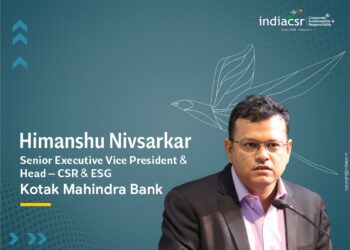Today more than ever, awareness is increasing in regard to our role, both as individuals and industries, to preserve our planet for future generations- bringing sustainability to the forefront. Not only is it a growing social issue, but consumers are becoming more aware of sustainable practices, particularly in the hospitality industry, as information becomes more transparent” says Noémie Danthine, Director of Strategy & Sustainability at EHL Group.
Noémie designs and deploys the Group’s Corporate Social Responsibility strategy, including sustainable development, skills-based sponsorship, and ethical and social responsibility. She joined EHL Group in 2012 and obtained an executive MBA with specialization in CSR from the University of Geneva in 2018. In conversation with Rusen Kumar, editor, India CSR; Noémie Danthine shared about sustainability in the hospitality industry today.
How has the pandemic transformed the hospitality education industry?
Like in many other industries, the sanitary situation has accelerated the pace of digitization in education. Traditionally, the hospitality industry has been a rather conservative industry when it comes to technology but during the pandemic, many businesses were forced to digitalize to cope with the changes and be resilient. At EHL Group, we believe that this trend towards digitalisation is an opportunity for experiential learning and hospitality courses to expand their reach and to become more widely available to students. As we make strides in the development of new technologies, we already see applications of how practical learning can benefit from a remote approach. More students can learn from more experts and professionals from all corners of the world. Both practical and theoretical classes can develop a whole new range of solutions through new technologies like virtual or augmented reality or even artificial intelligence.
In addition, the unprecedented COVID-19 outbreak has reminded us of the importance of lifelong learning. Conversations around upskilling have come to the fore as establishments realize the need to build skills to stay relevant and competitive in the ever-changing environment of a post-pandemic world. Upskilling and lifelong learning, began at EHL even before the pandemic with a period of reflection, research, and expectations for the future of education to make it suitable to tomorrow’s working environment. Nowadays EHL Group offers programs not only for undergraduates or graduates but also for mid-career professionals in the industry who are looking to upskill and reskill to upgrade themselves. On our campus in Singapore, we offer a range of short courses for this exact purpose such as People Analytics, Luxury Brand Management or Designing Hotels and Restaurant Concepts just to name a few.
And last but not least, the pandemic has been a catalyst for resilience, particularly in the hospitality industry, thus revealing the importance of soft skills in facing and adapting to new challenges. At EHL Hospitality Business School, the soft skills acquired in the hospitality management learning journey enable our graduates to be more agile when choosing a career. About half of our graduates pursue their careers in industries beyond hospitality, like private banking, real estate management, consulting, luxury goods, etc.
Why are sustainable programs essential for the hospitality industry in today’s world?
Today more than ever, awareness is increasing in regard to our role, both as individuals and industries, to preserve our planet for future generations- bringing sustainability to the forefront. Not only is it a growing social issue, but consumers are becoming more aware of sustainable practices, particularly in the hospitality industry, as information becomes more transparent.
At EHL Hospitality Business School, we prepare the next generation of hospitality leaders for the trends and matters that have reshaped and are still reshaping the industry, and we believe that education is paramount to prepare and teach individuals to look after the planet. Sustainability is a topic that is tackled in class both transversally and in stand-alone courses.
However, more than the technical knowledge of sustainability, we believe that it is the generalization of a mindset that will enable us to set the world on the right path. We consider that our students should be nurtured into responsible leaders of the future and held accountable for their actions both inside and outside of the classroom. We aim to provide many opportunities for our students to learn about sustainability through projects that they work on, and in their daily life on campus.
With the right mindset, our alumni will have a positive impact on society throughout their careers, and this will be EHL’s biggest contribution to effecting positive change on the world.
Details on EHL’s various sustainable projects, courses and modules on sustainability?
EHL first raises awareness about sustainability during the student’s preparatory year by raising issues that are salient in the hospitality industry such as waste management, local food, responsible consumption, packaging, and recycling.
Within our Bachelor in International Hospitality Management’s Degree, we have four courses that focus entirely on sustainable innovation, CSR, and ethics, which are : Corporate Sustainability, Corporate Social Responsibility and Sustainable Innovations, Business Ethics, Diversity and Inclusion. Outside of the classroom, we try to involve students in as many sustainability initiatives as possible. It is our students that organize our sustainability weeks and SDG related events; they have opportunities to work with the expert sustainability team on specific projects and are invited to speak or participate in sustainability workshops. So far in 2021, 24 SDG related events were organized including a sustainability week and a SDG Summit that gather thousands of students.
During their time at EHL, students have the opportunity to attend field visits to local producers and organic certified producers to learn about the supply chain and the connection between the hospitality sector and nature. Some students also take part in Corporate Social Responsibility-related Student Business Projects (CSR SBP), which enables them to work on a project with a societal purpose. Each semester, one to two CSR SBP are granted free of charge to an organization, following a selection process by an EHL commission.
EHL’s environment enables students to align talk with actions and provides them with an eye-opening experience by showcasing real examples of CSR and sustainability initiatives. EHL’s own sustainability initiatives are highly visible, in order to inspire students, and students have opportunities to propose and implement initiatives to make EHL’s campuses more sustainable on a daily basis.
What is the campus doing to prepare the next generation of sustainability-conscious leaders?
There are several main sustainable initiatives across EHL and its three campuses.
EHL Campus Lausanne has been designed and built as a green campus, in line with the very demanding swiss Minergie-P standards. The building has been optimised for lowest energy consumption while providing maximum comfort. Equipped with geothermal probes that will harvest the heat from a depth of 800m and a novel wastewater heat recovery system, the building is designed to be self-supplying about 90% of its heating even through winter. We are also working hard on phasing out the use of single-use items and have recycled 66% of the waste generated in 2020. A surface area of 1000m2 of solar panels has also been installed to generate green energy for campus usage.
EHL organized its first sustainability week in 2019, with lots of events and conferences on campus to raise awareness on sustainability and all it encompasses. The 2020 sustainability week was organized online due to covid, which provided the opportunity to involve all three campuses.
At EHL Campus Passugg, home to EHL Swiss School of Tourism & Hospitality, we have significantly reduced the use of single-use plastic and we are encouraging low-carbon mobility through using only hybrid business cars and electric bikes on campus. EHL Campus Passugg, which offers a Major in Culinary Arts, has been a long-term partner of United Against Waste where joint projects such as Food Waste Management workshops and testing of the Food Save App. This app is an important source of inspiration for students, providing valuable impulses for the optimisation of kitchen processes, design of offerings and most importantly recycling leftover food.
The newly established EHL Campus (Singapore) at Kinloss House is of course also designed with sustainability in mind. It includes carbon-neutral floors, and the EHL Singapore team is working with local caterers to curate responsible menus. The staff, faculty members and students also share a shuttle bus to and from the campus and MRT station to reduce the amount of traffic in the city.
Last but not least, students on all three EHL campuses have access to an online platform named Alaya, where they get proposals for volunteering activities and can participate in fun challenges to set habits for a more sustainable way of life.
What is the result of these projects?
As a result of these initiatives, not only is EHL Group making progress towards our sustainability commitments and the reduction of our carbon footprint, but it is doing so visibly and with the active participation of our 3’800 students. Our communication with students on the topic of sustainability has been increased in 2020, as EHL participated in the Positive Impact Rating, which enabled to better understand student’s expectations and address them.
Hospitality industry in the post COVID world and what lies ahead
The hospitality industry won’t be revolutionized post-pandemic, but certain trends which had already started before will largely accelerate: a shift towards digitalization and technology; higher demand for sustainable hospitality, a larger focus on well-being, human centered and compassionate management, benevolence, and inclusion. Businesses who are not prepared to review their business model to adapt to these changes will probably disappear, while those who show true resilience will be joined by newcomers with completely new business ideas.
Another interesting notion is that, as certain regions of the world will be visibly impacted by climate change, people will develop new expectations, new habits and as tourists, target new destinations. Hence businesses that can anticipate the impacts and either leverage the challenges presented to them by the changes in climate or – in certain cases – relocate before it is too late, will come out on top.























